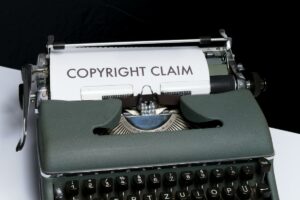Contents
At Sprintlaw, we’ve spoken to hundreds of businesses about protecting their intellectual property (IP).
The most common questions we get are around registering copyright:
- Can I protect my idea?
- Do I have to register copyright?
- How do I protect my copyright?
- How do I know it’s my copyright?
- Can someone else take my copyright?
Unlike other countries, there isn’t a register of copyright works in the UK.
In fact, it works a little differently here.
Here’s what you need to know and what you can do to protect your copyright.
How Does Copyright Work?
In most common law jurisdictions, copyright is essentially “automatic”.
You can’t protect an idea. But, it can be protected once that creative idea is expressed in some material form.
This means that once a creative idea is materialised, copyright arises automatically.
What does this mean?
If you have an idea, you may express it in some form.
This could include writing it down on paper, creating it on a website, designed as a graphic or translating it into software code.
Once that original work is created and expressed in some material form, copyright is automatic. And, if you’re the one that created it, that copyright is automatically yours.
Do I Need To Register My Copyright?
No, there is no need to register copyright in the UK.
Registration is only required for protections such as a trade mark, design or a patent (we’ve written about the different ways to protect your IP here).
But copyright is different.
Since it’s automatic, there is no need to register it to become yours.
How Do I Protect My Copyright?
So, we know that copyright is automatic.
Where does this leave you?
To actually protect that copyright, there are a number of different things you can implement contractually whenever you engage with others.
Generally, whoever first creates the original work is the owner of that copyright.
But what happens if you want others to use those rights? Or someone else creates work for you that you want to own? Or if you want to sell those rights?
There are a number of different situations in which copyright can be protected through having the right legal documents in place.
I’ve listed some examples below, but what you’ll need will depend on your individual circumstances and interests as a business.
| Legal Document | What Is It And When Do I Need It? |
| Copyright Disclaimer | A Copyright Disclaimer is a simple legal statement stating that you own the copyright to something you’ve created (such as a book that you’ve written). |
| Intellectual Property (IP) Assignment Deed | An IP Assignment Deed is a legal document where the creator transfers (all or part) ownership of a copyright-protected work to someone else. For example, if a graphic designer designs your logo, you might want them to “assign” the IP rights to you. |
| IP Licence | An IP Licence is a legal contract where the creator can still retain ownership of the copyright but permit others to use it, in return for a “licence fee”. You can also add extra conditions to this licence (such as telling others what they can and cannot do with your copyright work). |
| General Terms & Conditions | You can also protect your copyright in your General Terms & Conditions. This is generally done through an intellectual property clause that states that you still own all rights to your copyright-protected work. |
| Non-Disclosure Agreement (NDA) | While confidential information isn’t technically copyright, you might also be interested in having a Non-Disclosure Agreement (NDA) to protect any confidential information you disclose during business dealings (such as discussions with potential investors). |
| Employment Agreement | When your employees create original work under their employment with you, an Employment Agreement ensures that the IP rights are owned by the business (and not the employee). |
If you want to protect your business assets — such as your logo or business name — you may also be interested in applying for a trade mark. You can read more about this here.
How Can A Lawyer Help Me?
If you’re still unsure about where you sit in terms of copyright, it’s a good idea to speak with a lawyer.
Copyright can sometimes be confusing — especially if there are lots of parties involved in creating original works. In this case, it might be difficult to determine exactly who has the rights to that work.
And, if you need legal documents drafted to protect your copyright, a good intellectual property lawyer will draft the right document to protect you as much as possible.
Otherwise, if you’re still not sure about the legals behind copyright, we’re here to help!You can chat to our friendly team at [email protected].
Get in touch now!
We'll get back to you within 1 business day.












